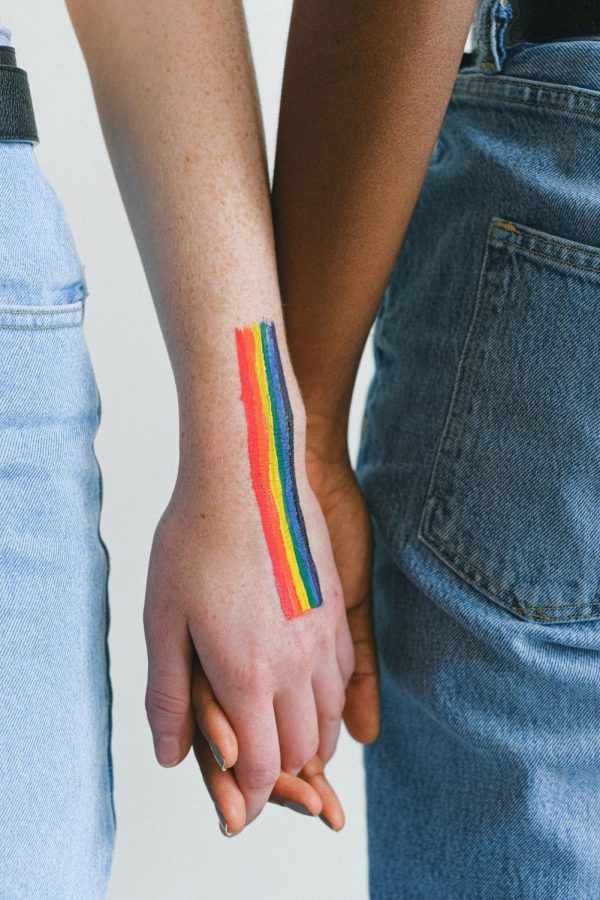Traveling the world through film: The LGBTQ+ film festival displays global perspectives
May 10, 2023
Students and faculty members shared deep conversations about the representation of the LGBTQ+ community through perspectives in the film “Rafiki” at the first LGBTQ+ film festival night on May 4. The festival will continue each Thursday in Samuelson Hall 104 from May 4 to June 1.
Volha Isokava, the Russian program advisor and chair of the department of world languages and cultures at CWU, said that a main goal of the film festival is to tie LGBTQ+ issues and world cultures together.
“[The film selection] came jointly out of conversations between me and Michelle O’Brien, who is the director of Women, Gender and Sexuality Studies,” Isokava said. “We thought that to have an event leading to [pride month] would be a great idea… World Languages and Cultures bring sort of a global cultural perspective, and Women, Gender and Sexuality Studies bring the queer studies perspective, we thought it would be a good event to put on together.”
Each week, a movie will be shown that represents one letter of the acronym, LGBTQ+, from around the world. Thus, the first movie, “Rafiki,” was a 2018 film by Wanuri Kahiu about two Kenyan women who fall in love, despite their fathers being political rivals.
Lacy Ferrell, an associate professor of history at CWU with a passion for African studies, said that it is important for all students to learn more about African culture.
“I think it’s wonderful to expose our students to more African culture and film and history and everything that comes along with that,” Ferrell said. “I don’t think that our students, especially through our K through 12 system, get much content about Africa, African people or African lives.”
Ferrell also said that “Rafiki” is an influential film because it displays love and joy.
“The filmmaker, she went into this wanting to highlight joy, resilience, hope and optimism, and just the colorful multiplicity of lives of people in Nairobi,” Ferrell said. “It’s a really fun, positive representation of what exists in Africa that I think also counters a lot of the assumptions or preconceived ideas that people might come to an African film with.”
“Rafiki” was the first film in the weekly, month-long series. On Thursday May 11, the film “Twilight’s Kiss” will be shown, a 2019 movie about two older, retired men in Hong Kong who fall in love with each other.
The following week, on May 18, the featured film will be “Margarita with a Straw,” a 2014 movie set in India that highlights a bisexual girl who plays music, travels, and makes connections with the people she meets.
May 25 will feature a 2020 movie called “Little Girl,” a story of a young transgender girl in France and the scrutiny she faces from the public.
The last movie in this film series will be “Wildhood,” a 2021 film about a young man who embarks on a journey with his half-brother to meet his mother and along the way, meets a Two-Spirit person who helps him reconnect to his Native American heritage.
The Two-Spirit is an ancient Native American belief in which certain people hold the spirits of both a man and a woman in their body- similar to nonbinary or genderfluid people.
“I think it’s interesting talking about the Native American perspective and not being aware of this long history of what the Native American community has decided to call Two–Spirit,” Ferrell said. “It’s got a much longer, deeper embedded cultural history for Native Americans. Similarly, I think with a film like ‘Rafiki,’ it opens up the opportunity to see how different gendered identities [and] different sexualities have long histories in African societies.”
Isokava also said she believes that showing these films allows students to see perspectives other than their own.
“I hope that it will broaden horizons,” Isokava said. “It’s an important thing to kind of understand other cultures and identities better and to experience solidarity with queer people from around the world.”
Senior history major, Tyler Hague, said this film festival is a great way to highlight some of the movies and perspectives that students may not otherwise be exposed to.
“I just think it’s really good,” Hague said. “There’s a whole plethora of [LGBTQ+] cinema that hasn’t really been pushed to the forefront.”
Hague said he was able to connect to “Rafiki,” even though it was different from his own culture.
“When you get invited to these events, [sometimes] the movie is just a little too inaccessible to someone who isn’t very familiar with a certain culture or certain area of the world,” Hague said. “What I liked about [Rafiki] is that it felt very…accessible. You understand how this world works. You understand the family dynamics and what’s going on.”
Hague also said he felt that films are a great way to see more cultural perspectives.
“Stories are a great way to relate to people, to see people on a level that you normally wouldn’t,” Hague said. “I believe firmly in using fiction to broaden your empathy.”


